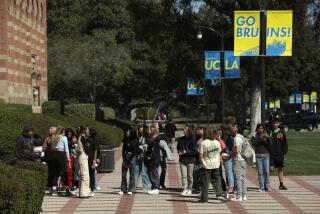Wrong patient got kidney at USC
- Share via
USC University Hospital halted kidney transplants last month after a kidney was accidentally transplanted into the wrong patient, according to a spokesman for the program that coordinates organ transplants in Los Angeles.
The patient who received the wrong kidney escaped harm, apparently because the kidney happened to be an acceptable match, said Bryan Stewart, spokesman for the program, OneLegacy, which was notified of the error by the hospital.
The hospital, which performs about two transplants a week, confirmed in a statement that it had voluntarily halted transplants Jan. 29 after a “process error” was discovered. The hospital did not detail the nature of the error and declined to answer questions. It said no patients were harmed.
Dr. Goran Klintmalm, a veteran surgeon at Baylor Regional Transplant Institute in Dallas, said that such a mistake is almost inconceivable.
“The safeguards are very substantial,” he said. “I can’t even imagine how this mistake could have happened.”
The mix-up apparently occurred after two kidneys, from separate donors, arrived at the transplant center around the same time on Jan. 29, a Saturday.
“Our packaging and documentation was accurate,” said Thomas Mone, the chief executive of OneLegacy. “Presumably this was human error” at the hospital.
After USC realized its mistake, the organ procurement organization used blood samples it had on reserve to conduct what is known as a “cross-match” — a test to see if the transplanted kidney was compatible with the person who received it, Stewart said.
A mismatched organ can be deadly. As it turned out, the patient was not harmed, largely because the donor’s blood type was O, which is universally accepted. The organ procurement organization then embarked on finding an acceptable recipient for the other kidney. It was transplanted into a patient at another local hospital, Stewart said.
The intended recipient of the misplaced kidney received another organ a few days later.
The incident has triggered investigations by the state Department of Public Health and by the United Network for Organ Sharing (UNOS), which oversees the transplant system for the U.S. government. Neither agency has released any findings.
“The hospital inactivated the program while clinical protocols are assessed and additional safeguards to the kidney transplant program are developed,” the hospital’s statement said.
The hospital said transplants may resume as early as Friday.
The hospital said it notified UNOS on Feb. 4 that it had voluntarily halted the kidney program.
UNOS’ review requires the hospital to submit a “corrective action plan” that must be approved by the agency, the hospital said.
Kidneys are in short supply in the U.S., and especially in Southern California. As of Feb. 11, USC had 508 patients waiting for kidneys (313 men and 195 women), according to UNOS. In the Los Angeles area, there were 6,044 people waiting for kidneys at 13 transplant centers.
As of late Thursday, USC hospital’s website still listed kidney transplants among its services and there was no obvious notice to patients or the public that the program had been suspended.
In general, immediately after a kidney is removed from a donor, it is placed in a plastic container with a screw-on lid. That container, labeled with an identification number, is then placed inside three sterile plastic bags, which are placed on ice in another container.
“The nurses in the operating room and the surgeon must check for the ID number on the kidney and compare that with the patient ID number,” Klintmalm said.
“It is the operating room surgeon’s responsibility to make sure the numbers match,” he said. “You sign forms before you start the surgery.”
The protocols were established by a special committee of UNOS.
The procedures were extensively reviewed and updated in 2003, after a highly publicized case in which Duke University surgeons accidentally gave the wrong heart and lungs to a 17-year-old girl. She later died.
In 2006, a Times investigation found that about a fifth of federally funded transplant programs failed to meet the government’s minimum standards for patient survival or performed too few operations to ensure competency. And, despite repeated lapses, federal overseers allowed 488 heart, liver and lung transplant centers to continue operating.
Tony Messana, executive director of the kidney transplant program at St. Joseph Hospital in Orange, said the entire transplant field would take note of the incident at USC University Hospital.
“This shouldn’t happen,” Messana said. “This is one of those very rare occurrences.”
Messana said “other programs here will pick up the slack” for as long as USC’s program is closed.
Times staff writers Shari Roan and Molly Hennessy-Fiske contributed to this report.








